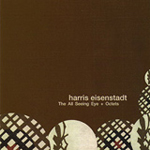|
|
 |
Dusted Reviews
Artist: Harris Eisenstadt Album: The All Seeing Eye + Octets Label: Poo-Bah Review date: Aug. 14, 2007 |

|
|
|
 |
Percussionist Harris Eisenstadt demonstrates historical savvy and versatility on this, his sixth disc as a leader. His aim is two-fold; he re-interprets Wayne Shorter’s Blue Note classic, but two of his own larger compositions are also presented in beautifully transparent arrangements that crackle with energy, even in moments of near silence.
Re-interpretations are increasingly suspect as far as I’m concerned; they often take on the feel of monuments—static, superficially impenetrable one-dimensional entities that enshrine rather than enhance. Eisenstadt’s take on Shorter lacks some of the novelty so evident on the original, the edge-of-seat adventurousness usually accompanying first performances of new pieces. “Mephistopheles” isn’t nearly as slinky here, and somehow, a bit of “Genesis”’s grandeur is lost with vibes replacing Herbie Hancock’s vibrant pianism.
However, there’s a wealth of color, and the piano’s absence does allow for shade and contrast to be more readily apparent. The title track’s opening staggered counterpoint and chords shine brightly due to the more wind-heavy orchestration, extremes in register in stark relief demonstrating Shorter’s now legendary penchant for melodic writing. Similarly, the passage of time has allowed for the dissonances in “Mephistopheles” to be integrated into the more general musical vocabulary, and they are beautifully executed here, with Scott Walton’s acoustic bass heavy and sinister below.
Walton emerges as a hero of sorts throughout; his precise underpinnings infuse the opening movement of “Without Roots,” the first of two larger Eisenstadt suites presented here. The movement is an astonishing steady in articulation, slow-fading colors and blurred lines emerging into a pointilistic dialogue, concentric sonorities giving way to shards and fragments of themselves. Muted trumpet, bassoon and bass clarinet provide a degree of homogeneity while texture allows for constant change, Chris Dingman’s vibes with varying vibrato speed covering much of the music with a metallic sheen. The fusion of 20th century classical and “jazz” gestalts is so complete that when the transition finally occurs, some way into the second movement, its naturalness is beguiling.
If Eisenstadt wishes to demonstrate Shorter’s influence on his own work, he’s succeeded. The result is a mixed blessing though, as the Shorter renditions seemed somewhat superfluous by album’s end. This is certainly not to suggest that they are superficial in any way, and the playing is very fine throughout. My only real complaint is with the recording itself, which seems natural albeit a bit dry. The originals could have used some space for the timbres and silences to breathe. That said, this is a bold statement from a fine composer and a first-rate assemblage of players.
By Marc Medwin
|







